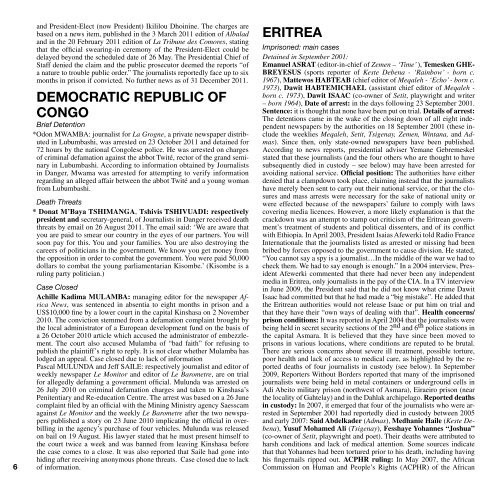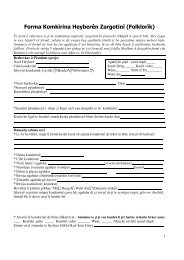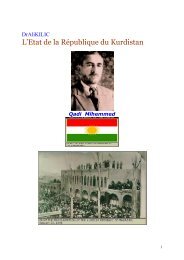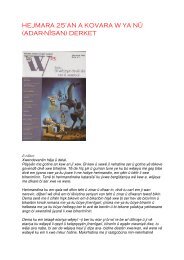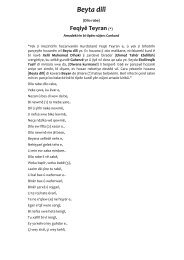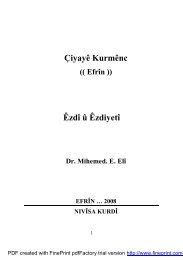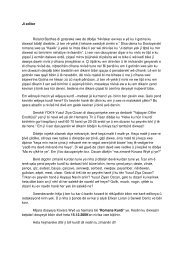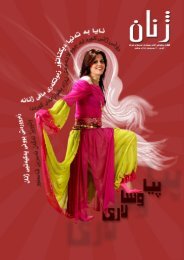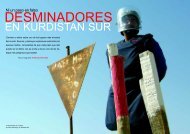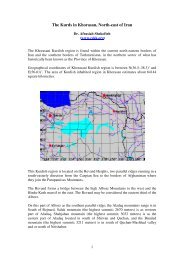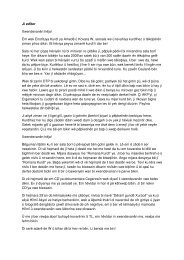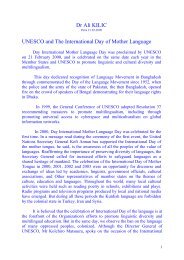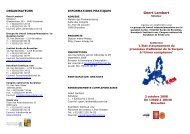Caselist - PEN International
Caselist - PEN International
Caselist - PEN International
You also want an ePaper? Increase the reach of your titles
YUMPU automatically turns print PDFs into web optimized ePapers that Google loves.
and President-Elect (now President) Ikililou Dhoinine. The charges arebased on a news item, published in the 3 March 2011 edition of Albaladand in the 20 February 2011 edition of La Tribune des Comores, statingthat the official swearing-in ceremony of the President-Elect could bedelayed beyond the scheduled date of 26 May. The Presidential Chief ofStaff denied the claim and the public prosecutor deemed the reports “ofa nature to trouble public order.” The journalists reportedly face up to sixmonths in prison if convicted. No further news as of 31 December 2011.DEMOCRATIC REPUBLIC OFCONGOBrief Detention*Odon MWAMBA: journalist for La Grogne, a private newspaper distributedin Lubumbashi, was arrested on 23 October 2011 and detained for72 hours by the national Congolese police. He was arrested on chargesof criminal defamation against the abbot Twité, rector of the grand seminaryin Lubumbashi. According to information obtained by Journalistsin Danger, Mwama was arrested for attempting to verify informationregarding an alleged affair between the abbot Twité and a young womanfrom Lubumbashi.Death Threats* Donat M’Baya TSHIMANGA, Tshivis TSHIVUADI: respectivelypresident and secretary-general, of Journalists in Danger received deaththreats by email on 26 August 2011. The email said: ‘We are aware thatyou are paid to smear our country in the eyes of our partners. You willsoon pay for this. You and your families. You are also destroying thecareers of politicians in the government. We know you get money fromthe opposition in order to combat the government. You were paid 50,000dollars to combat the young parliamentarian Kisombe.’ (Kisombe is aruling party politician.)Case ClosedAchille Kadima MULAMBA: managing editor for the newspaper AfricaNews, was sentenced in absentia to eight months in prison and aUS$10,000 fine by a lower court in the capital Kinshasa on 2 November2010. The conviction stemmed from a defamation complaint brought bythe local administrator of a European development fund on the basis ofa 26 October 2010 article which accused the administrator of embezzlement.The court also accused Mulamba of “bad faith” for refusing topublish the plaintiff’s right to reply. It is not clear whether Mulamba haslodged an appeal. Case closed due to lack of informationPascal MULUNDA and Jeff SAILE: respectively journalist and editor ofweekly newspaper Le Monitor and editor of Le Barometre, are on trialfor allegedly defaming a government official. Mulunda was arrested on26 July 2010 on criminal defamation charges and taken to Kinshasa’sPenitentiary and Re-education Centre. The arrest was based on a 26 Junecomplaint filed by an official with the Mining Ministry agency Saesscamagainst Le Monitor and the weekly Le Barometre after the two newspaperspublished a story on 23 June 2010 implicating the official in overbillingin the agency’s purchase of four vehicles. Mulunda was releasedon bail on 19 August. His lawyer stated that he must present himself tothe court twice a week and was banned from leaving Kinshasa beforethe case comes to a close. It was also reported that Saile had gone intohiding after receiving anonymous phone threats. Case closed due to lackof information.ERITREAImprisoned: main casesDetained in September 2001:Emanuel ASRAT (editor-in-chief of Zemen – ‘Time’ ), Temesken GHE-BREYESUS (sports reporter of Keste Debena - ‘Rainbow’ - born c.1967), Mattewos HABTEAB (chief editor of Meqaleh - ‘Echo’ - born c.1973), Dawit HABTEMICHAEL (assistant chief editor of Meqaleh -born c. 1973), Dawit ISAAC (co-owner of Setit, playwright and writer– born 1964), Date of arrest: in the days following 23 September 2001.Sentence: it is thought that none have been put on trial. Details of arrest:The detentions came in the wake of the closing down of all eight independentnewspapers by the authorities on 18 September 2001 (these includethe weeklies Meqaleh, Setit, Tsigenay, Zemen, Wintana, and Admas).Since then, only state-owned newspapers have been published.According to news reports, presidential adviser Yemane Gebremeskelstated that these journalists (and the four others who are thought to havesubsequently died in custody – see below) may have been arrested foravoiding national service. Official position: The authorities have eitherdenied that a clampdown took place, claiming instead that the journalistshave merely been sent to carry out their national service, or that the closuresand mass arrests were necessary for the sake of national unity orwere effected because of the newspapers’ failure to comply with lawscovering media licences. However, a more likely explanation is that thecrackdown was an attempt to stamp out criticism of the Eritrean government’streatment of students and political dissenters, and of its conflictwith Ethiopia. In April 2003, President Isaias Afewerki told Radio France<strong>International</strong>e that the journalists listed as arrested or missing had beenbribed by forces opposed to the government to cause division. He stated,“You cannot say a spy is a journalist…In the middle of the war we had tocheck them. We had to say enough is enough.” In a 2004 interview, PresidentAfewerki commented that there had never been any independentmedia in Eritrea, only journalists in the pay of the CIA. In a TV interviewin June 2009, the President said that he did not know what crime DawitIsaac had committed but that he had made a “big mistake”. He added thatthe Eritrean authorities would not release Isaac or put him on trial andthat they have their “own ways of dealing with that”. Health concerns/prison conditions: It was reported in April 2004 that the journalists werebeing held in secret security sections of the 2 nd and 6 th police stations inthe capital Asmara. It is believed that they have since been moved toprisons in various locations, where conditions are reputed to be brutal.There are serious concerns about severe ill treatment, possible torture,poor health and lack of access to medical care, as highlighted by the reporteddeaths of four journalists in custody (see below). In September2009, Reporters Without Borders reported that many of the imprisonedjournalists were being held in metal containers or underground cells inAdi Abeito military prison (northwest of Asmara), Eiraeiro prison (nearthe locality of Gahtelay) and in the Dahlak archipelago. Reported deathsin custody: In 2007, it emerged that four of the journalists who were arrestedin September 2001 had reportedly died in custody between 2005and early 2007: Said Abdelkader (Admas), Medhanie Haile (Keste Debena),Yusuf Mohamed Ali (Tsigenay), Fesshaye Yohannes “Joshua”(co-owner of Setit, playwright and poet). Their deaths were attributed toharsh conditions and lack of medical attention. Some sources indicatethat that Yohannes had been tortured prior to his death, including havinghis fingernails ripped out. ACPHR ruling: In May 2007, the AfricanCommission on Human and People’s Rights (ACPHR) of the AfricanUnion ruled that the detention of the journalists was arbitrary and unlawfuland called on the Eritrean government to release and compensate thedetainees. Information on Dawit Isaac: Isaac, who spent a number ofyears in Sweden during the Eritrean war of independence and the borderdispute between Eritrea and Ethiopia, holds Swedish citizenship. In November2001, the Swedish local consul held a brief meeting with Isaac injail. In April 2002, it was reported that Isaac had been hospitalized sufferingfrom injuries sustained through his torture. In November 2005, Isaacwas briefly released for a medical check-up and was allowed to call hisfamily and friends in Sweden. This was due to pressure by groups inSweden but did not lead to Isaac’s release: he was returned to prison twodays later with no explanation. Since then Isaac has reportedly beenmoved to various prisons around the country. In January 2009, he wasreportedly transferred from prison to an Air Force hospital in Asmara asa result of serious illness but was later returned to prison. The most recentreports indicate that Isaac is being held at Eiraeiro prison camp, 10 milesnorth of the capital Asmara, along with a number of the other detainedjournalists. As of January 2010, Isaac was reportedly being kept in solitaryconfinement, in a tiny cell with no windows and was in very poorphysical and mental health. He and the other inmates are reportedly notallowed any contact with each other or the outside world, are routinelyshackled and receive almost no medical care. Many are in a very poorpsychological state. As of 27 October 2010, when Isaac turned 46, he hadstill not been formally charged with any crime, and his whereabouts remainedunclear. A new collection of his writings, entitled Hope- the Taleof Moses and Manna’s Love, was unveiled at Sweden’s Goteborg bookfair in late September 2010. Update on IsaacOn 18 May 2011, duringthe 21 st Session of the African, Caribbean, Pacific – European Union(ACP-EU) Joint Parliamentary Assembly held in Budapest, EU and Africancountries decided that the Assembly’s next report on human rightswould focus on Isaac. This came about as a result of efforts by SwedishMEP Olle Schmidt, who has taken a special interest in Isaac’s case. Accordingto a 3 August 2011 report by the Committee to Protect Journalists,the whereabouts and health status of Isaac and the other detainedjournalists remain unknown. In July 2011, Isaac’s brother, Esayas Isaac,reportedly filed a writ of habeas corpus with Eritrea’s Supreme Courtcalling for information on the journalist’s location and a review of hisimprisonment. The writ was not supported by the Swedish government;Foreign Minister Carl Bildt reportedly said the country’s goal was to haveIsaac released on humanitarian grounds rather than stand trial. HealthConcerns: Isaac reportedly suffers from a diabetic condition that requiresmedical supervision. : In its 2011 report, Amnesty <strong>International</strong> reportedthat Isaac remained in detention, allegedly in Eiraeiro prison camp. Hewas reportedly in poor mental and physical health.. Recent informationon other journalists: On 18 February 2010, Reporters Without Bordersreported that Emanuel Asrat and Dawit Habtemichael, like Isaac, werebeing held at Eiraeiro prison camp (cells 25 and 12 respectively). However,an April 2010 article by the Committee to Protect Journalists cited areport by Radio Wegehta, an opposition station based in Ethiopia, inwhich an alleged former prison guard at Eiraeiro stated that Habtemichaelhad died in custody, in addition to the four journalists named above;this death is unconfirmed. The former guard reportedly also said that YusufMohamed Ali had died in June 2003 as a result of extreme heat, MedhanieHaile had died due to lack of medical treatment while FesshayeYohannes “Joshua” and Said Abdelkader had committed suicide. Thesereports are likewise unconfirmed. No further news as of 30 June 2011.Update: According to Reporters Without Borders, the journalists are stilldetained as of 16 September 2011. In September 2011, the European Parliamentadopted a strongly worded resolution urging Eritrea to “lift theban on the country’s independent press and to immediately release independentjournalists and all others who have been jailed simply for exercisingtheir right to freedom of expression.” Honorary Members: American<strong>PEN</strong>, <strong>PEN</strong> Canada. Dawit Isaac is an Honorary Member of Finnish<strong>PEN</strong> and Swedish <strong>PEN</strong>. Awards: Isaac was awarded the 2009 TucholskyAward by Swedish <strong>PEN</strong> and the 2011 Golden Pen of Freedom, the annualpress freedom prize of the World Association of Newspapers andNews Publishers (WAN-IFRA).Mahmud AHMED SHERIFFO, Haile WOLDETESNAE, PetrosSOLOMON, Saleh Idris KEKIA, General Ogbe ABRAHA, AstierFESHATSION (f), Berhane GHEBRE EGHZABIHER, Hamid HI-MID, Estifanos SEYOUM, Germano NATI and Beraki GHEBRESELASSIE: former Minister of Local Government, former Ministerof Trade and Industry, former Minister of Fisheries, former Minister ofTransportation and Communication, and former Chief of Staff of the DefenceForce and Minister of Trade and Industry respectively (the final sixwere also former members of government), have been detained since 18or 19 September 2001 after the publication in May 2001 of an open lettercritical of the government addressed to members of the ruling People’sFront for Democracy and Justice (PFDJ) party. All 11 were members ofthe so-called G-15, a group of 15 PFDJ senior officials who signed theletter. They were arrested in Asmara on 18 and 19 September 2001 and accusedof crimes against national security and sovereignty. A twelfth G15member was also arrested but was released when he recanted. The threeremaining members were abroad at the time of the arrests and have notreturned to Eritrea. In February 2002, in the first parliamentary sessionsince 2000, President Issayas Afewerki declared that the G-15 membershad “committed treason by abandoning the very values and principles theEritrean people fought for”. The National Assembly therefore “stronglycondemned them for the crimes they committed against the people andtheir country”. After such statements it seems highly improbable that theeleven currently held will receive a fair trial. They have been held incommunicadoever since and it is not known whether they have been formallycharged. According to Amnesty <strong>International</strong>, their family and friendshave faced persecution whenever they have tried to speak out against thedetentions. In April 2009, Amnesty reported that at least one of the G-15 members, General Ogbe Abraha, had reportedly died in custody dueto the harsh conditions and lack of access to medical treatment. AstierFeshatsion was said to be suffering from stomach ulcers. Most recentinformation: According to Amnesty <strong>International</strong>, in early 2009 therewere unconfirmed reports that nine of the former government officialsknown as the G-15 had died in detention since 2002. In its 2011 report,Amnesty reported that the Eritrean government had failed to respond tothese allegations in 2010.Detained after 2001:Yirgalem ASFHA (f) (essayist and journalist - staff member at RadioBana, former art critic for the independent weekly newspaper Zemen;Yirgalem FISSEHA MEBRAHTU (f) (poet and journalist for RadioBana); Meles Negusse KIFLU: (writer, poet and journalist - Radio Zaraand Radio Bana, formerly worked for Tsigenay); Bereket MISGHINA(“Wedi Misghina”) (playwright and actor and staff member at RadioBana). Date of arrest: 22 February 2009, during a raid on Radio Bana,based in Addis Ababa, during which at least 50 employees were arrestedby the security forces. By April 2009, most had been released but a numberremain in detention. Reasons for arrest: No reason has been given forthe journalists’ arrest and they have apparently not been charged with any


